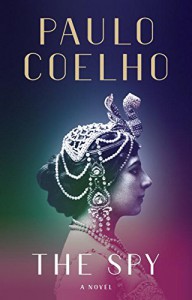Interesting thesis, but thin on details

Thanks to Net Galley and Random House UK for sending me an ARC copy of this book that I voluntarily decided to review.
This novel (as it clearly states) caught my attention for two reasons. First and foremost, because it was about Mata Hari, a figure surrounded by mystery and allure, but one I didn’t know much about (other than having watched a movie many years back about her). The second was the writer. I’m forever seeing quotes penned by Paulo Coelho, but I haven’t read one of his books for many years and I thought this would allow me to rekindle my interest and catch up on his work.
The book is short and it does not purport to be a detailed biography. As it’s not uncommon on books that share the story of a character who died by execution, in this case, the story is told, in part, by Mata Hari (or rather, Margaretha Geertruida "Margreet" MacLeod nee Zelle) while she is in prison, awaiting her fate. In this case, she is writing a letter to the lawyer that was, it seems, forced upon her. In Coelho’s version of the story, written in the first person, Mata Hari (as she’s had so many identities she no longer seems sure who she really is) is very angry and convinced that she will be saved by the intercession of one of her many friends and nobody will get to read this letter. Perhaps that explains it, but, somehow, although I don’t know the historical figures, it seems doubtful that somebody whose life, according to her, depended on her skills for promoting herself and enchanting others, would be so unaware of the effect her words would have. She appears self-obsessed, uninformed, given to random likes and dislikes, and manipulative. She describes sad and even harrowing moments (her abuse by a teacher, her rushed marriage and the terrible relationship with her husband, and the moment when the wife of another military man commits suicide, that makes her determined to escape what seems her likely fate) but a lot of the letter seems to be a list of meetings, trips, men she meets and little more. She describes in more detail the events that got her to end up in prison, but she talks more about clothing and fashion, her love for Paris, and her art and performances (especially to denigrate those whom she says are pale imitators, like Nijinski) than she does about her daughter, for instance.
The thesis of the book (and there seems to be one) is hinted at in her own letter, but more clearly stated in the last part of the book, a letter written by his lawyer, that is his attempt at apologising for his inability to do much for her. He insists that although there was no serious evidence to link her to any espionage activities, they used her as a scapegoat to hide men’s mistakes, divert public attention from the real guilty parties, and distract them from the disasters of war. A woman who dared to flaunt her nakedness, her lack of morals, and her independence had to be punished. This is an attractive thesis and it sounds plausible (and probably has more than a grain of truth), but although Coelho reminds us at the end that this is not a biography and he it is not exhaustive or true in its detail, the gaps and the information not included lessen her, rather than making her more interesting. To me she appeared superficial, and, although it is possible that she was, it seems doubtful that such a woman would have got that far (although fame and talent have a long history of not necessarily going hand in hand).
The style of writing is fluid and creates very distinct voices in the different parts, and the part written by the lawyer was more philosophical in nature, offering interpretations and lessons learned, that hat the effect of imposing a male meaning on a woman (that seems to be the opposite of the intended effect). The style of this segment seems more in keeping with Coelho’s usual writing and it is more lyrical. There is a clear voice coming through in the letter Mata Hari (the novel’s Mata Hari) writes too, but as mentioned, is not a particularly likeable one.
After finishing the book I checked some facts, and they paint a fairly different story, as things were quite hard for Margreet, rather than the walk in the park suggested by the novel. She seems to have been a woman who was a victim of circumstances early in life, who tried to do the best by her daughter and managed to find a way of being in control of her life, even if it meant manipulating others. Descriptions of her death and her final gesture (refusing to have her eyes covered and blowing the shooting squad a kiss) suggest that this strong and daredevil woman was more like the figure suggested by her full biography than the one that comes across in the book.
In sum, this is an intriguing book, it’s well-written, and it will make people curious to learn more about Mata Hari, but it is only one version of this fascinating woman and historical figure.







